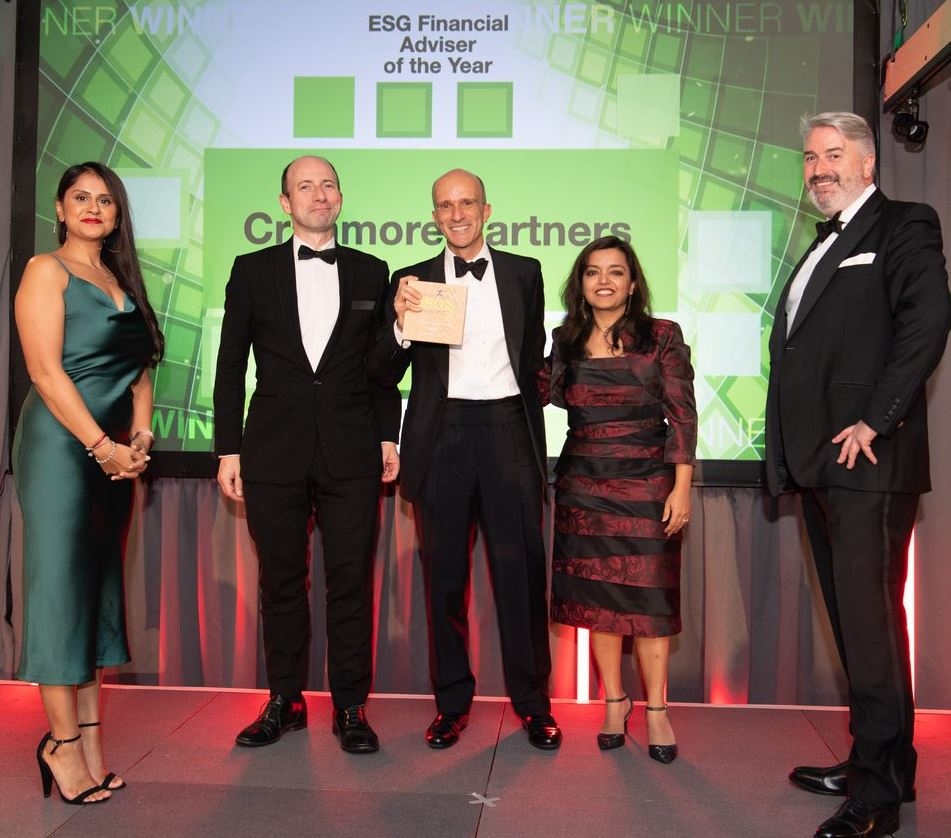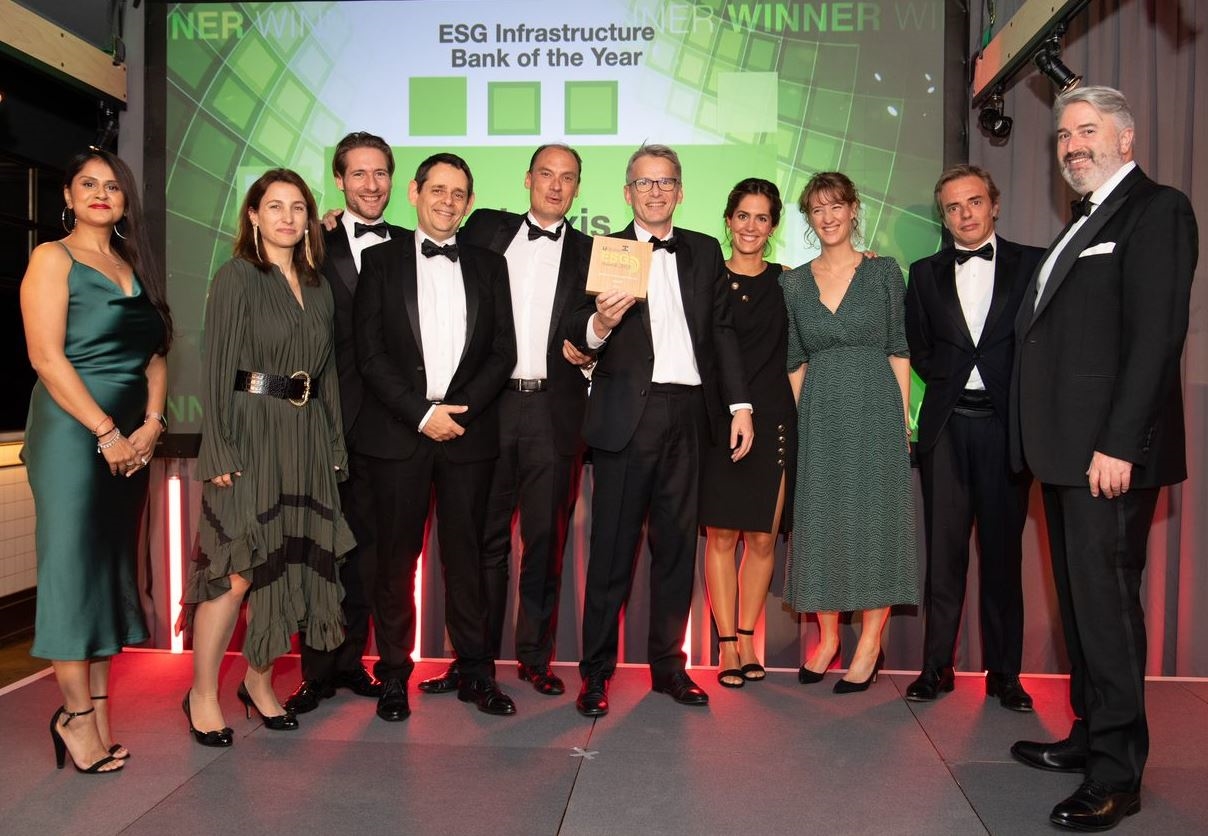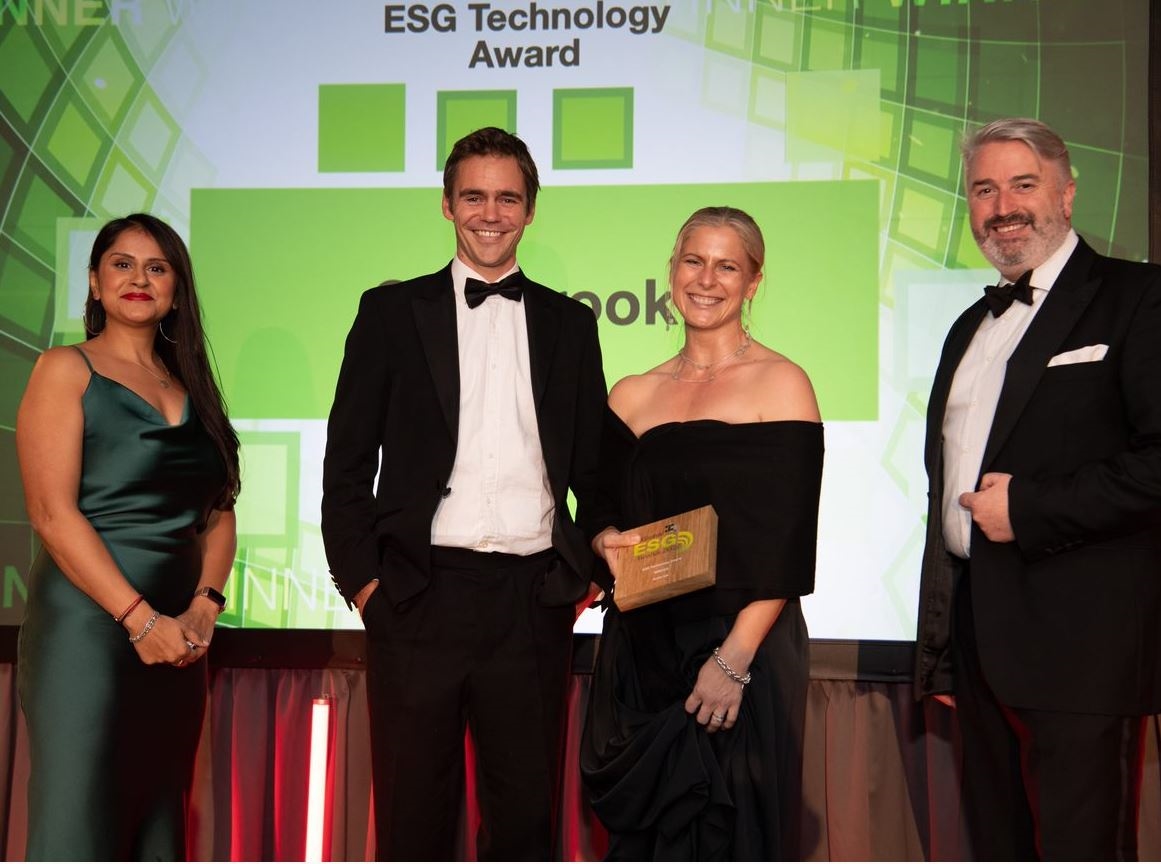IJGlobal ESG Awards 2021 – The Company Winners
The infrastructure community – those who could be there on the night in these times of Covid-19 – gathered this week in central London to celebrate the victorious at the inaugural IJGlobal ESG Awards.
It was with great delight that IJGlobal brought to conclusion 3 years of preparation to host the very first ESG awards on Thursday night in the BAFTA headquarters on Piccadilly, London, hosted by editor Ila Patel and editorial director Angus Leslie Melville.
IJGlobal is proud to have secured first-mover advantage by launching these awards this year and has plans in place to roll them out globally... and in this story we are focused on the company awards, to read about the winners in the deals category, click here...
Due to the international focus of this launch event, it was never going to be possible to fill the London venue with winners as – given coronavirus travel restrictions – it was impossible to lure people across from Japan, Latin America, etc.

On Thursday night in the BAFTA HQ – our awards were the last event to be hosted there prior to its complete refurbishment – there were a good number of winners on hand to pick up their awards (as you must have noticed form Friday’s slew of LinkedIn activity).
IJGlobal ESG Awards 2021 drew in a crowd of a little north of 100… considerably more than many in-person conferences are managing to achieve these days!
After a glass or two of Champagne (they lied), guests filed down to the auditorium for a sumptuous meal (they did not lie) followed by presentations to those who were on hand and (grinding teeth) announcing the ones that would be posted to the winners.
Here follows the run-down of winners in no particular order.
Legal Advisory
Three law firms that made it on to the shortlist for the IJGlobal ESG Legal Adviser of the year – but the accolade fell to Norton Rose Fulbright.
The judges recognised the firm’s pro-bono work with a “clear enunciation of E, S and G and sheer diversity/range of projects put forward” and another lauding work on Equator Principles as a “defining factor”.

Another celebrated the firm’s “global reach with notable transactions / activities in emerging markets”, adding that it warranted recognition for “comprehensive areas of expertise encompassing industry advisory/policy advocacy and applied services in real economy projects like Bita water.”
One of the judges rounded off comments saying: “Norton Rose presented a thorough submission touching on their contribution towards multiple ESG initiatives. Their extensive pro-bono work in relation to environmental and human rights issues stood out and – from a personal perspective – I have been impressed over the last year by their notable efforts in fighting systemic racism.”
The award was picked up on the night by partner Caroline May, head of sustainability for Europe, the Middle East and Asia. She is also head of environment, health and safety for the same regions.
Caroline was joined by fellow Norton rose Fulbright partner Imogen Garner and senior associates Benjamin Carrozzi and Hannah McAslan (all are pictured above right).
Financial Advisory
In a straight shoot out against PwC, financial advisory boutique Cranmore Partners won a David v Goliath battle to become the first IJGlobal ESG Financial Adviser of the Year.

The win for Cranmore is all the more impressive given its diminutive nature… when compared with Big 4 monster. The firm has offices in Abu Dhabi, London and Istanbul though it is active on projects globally, with primary focus on the wider Middle East, Central Asia and Africa.
The judges were swayed towards Cranmore based on a “significant and focused ESG commitment from a boutique advisory firm” in addition to a “decent range of transactions, and first mover across these”.
The praise for Cranmore was plentiful, celebrating its “good and important work in GCC” and an “impressive strategy given the region in which they're operating, allowing them to offer something genuinely different.” It was also lauded for “pioneering new technologies” for its work with green hydrogen.
One judge who clearly was impressed by the PwC submission said: “A very close call, but Cranmore comes first due to the pioneering role it has played in a region dominated by hard-to-abate businesses, which will help not only to develop more needed projects but also sets the bar for regional peers.”
Another judge who favoured Cranmore adds: “Cranmore positions itself as a thought leader in sustainability, and this was clear from their submission, particularly in the precision with which they spoke about large-scale deployment of green hydrogen. Furthermore, we appreciated their geographic breadth of transaction examples across Uzbekistan, Turkey and Spain.”
A further judge says: “Cranmore’s enthusiastic promotion of sustainability in jurisdictions where this can be harder to achieve set it apart from the other submissions who arguably have more ESG-focused client bases and balance sheet to help their case. Their work appears to genuinely focus on trying to deliver a more sustainable society for all.”
Finally one caps off: “Cranmore’s boutique nature and the ‘exotic’ jurisdictions they have been able to take a leading ESG role in commends them to me. Cranmore reflects strength and breadth across a range of portfolios and markets.”
The award was picked up on the night by Cranmore Partners founder and managing partner Yusuf Macun. He was joined on the stage by Cranmore partner Richa Prasad and executive director Nick Sinden (all pictured above left).
Infrastructure Bank
Natixis scooped the IJGlobal ESG Infrastructure Bank of the Year award on Thursday night winning out against shortlisted rivals CIBC and ING Bank with one judge saying it is “one of a number of banks leading the way in ESG”.
Another judge struck a more definitive note with “Natixis has for a long time shown leadership in the ESG field and applied its technical expertise to financing across various groups, including Mirova which has spun off.”

The praise came thick and fast with one judge admiring “Natixis' green weighting factor and environmental rating approaches” and another admiring its “NRG financing linked to clear GHG reductions, good ESG policy and thrust overall”.
One judge who was of a more verbose nature adds: “Natixis stood out given the implementation of their Green Weighting Factor. It is one thing for a bank to commit to decarbonising its lending portfolio, but quite another to actually develop and implement a proprietary weighting system that creates transparency and clear incentives throughout the organisation to achieve this.
“Furthermore, Natixis demonstrated a well-balanced approach in terms of their focus both on helping their clients to become more sustainable – such as the sustainability-linked bond for NRG – and their own organisational transformation.”
Pictured are (from left to right): Mathilde Boyer from Natixis in London; Christian Synetos from Blackrock; Pascal Soldaini, head of infrastructure and energy for the UK; Julien Duquenne, co-head of origination and advisory for the Natixis EMEA green and sustainable hub; Antoine Saint Olive, global head of infrastructure and energy finance at Natixis; Myriam Irastorza from the London Natixis team; Bettina Firino from Natixis London; and Javier Huergo, chief investment officer for Fotowatio Renewable Ventures (FRV).
The “environment” element of ESG
For the IJGlobal ESG Awards, we separated out each of the elements of environmental, social and governance to celebrate achievements across each of these categories as specialisms.
Hannon Armstrong won the IJGlobal ESG Award in the Environmental category for the role it plays as the first US public company solely dedicated to investments in climate solutions.
As Hannon Armstrong states in its submission: “Our core purpose is to make climate positive investments with superior risk-adjusted returns.”
And the ESG judges were keen to reward the role it has played, pointing out that it was “good to see a US firm leading the way with investments and fund raisings” and another adding that “Hannon Armstrong has been a pioneer in the US market in financing climate solutions”.
During the judging session, one judge said: “As a US public company, Hannon Armstrong is setting a high bar on its delivery on climate solutions. They have achieved notable ‘firsts’ in a number of areas and are driving improved transparency across the market and commitment to reporting.”
Judges were keen to support its progress pointing to “key features that are unique” and “dedication to climate solutions” as well as “lots of innovation noted – Carbon Count, for example – and green bonds, combined with its entire strategy and rationale for existence being ESG investments”.
Hannon Armstrong invests in climate solutions developed by leading companies in energy efficiency, renewable energy, and other sustainable infrastructure markets.
The company's goal is to generate attractive returns from a diversified portfolio of projects with long-term, predictable cash flows from proven technologies that reduce carbon emissions or increase resilience to climate change.
Due to travel restrictions, Hannon Armstrong was not represented in the room.
The "social" element of ESG
Atlas Renewable Energy was singled out for honours in the IJGlobal ESG Awards in the social category for the amazing impact it has been making across its projects in Latin America.
The judges were blown away by the Atlas submission with one saying it was “one of few entries to demonstrate true commitment to diversity” and another describing it as a “really good demonstration of effectively closing the gender gap” lauding it as a “great role model”.
On judge said: “Atlas is the most advanced in addressing gender issues, which also incorporates ethnic / race angles, while combining those with supporting clean energy with significant impact in emerging markets like Mexico and Brazil.”
Another added: “Atlas’s efforts to improve gender imbalance, and to promote an Afro-descendant workforce, go far further than the diversity initiatives typically touted.”
This was joined by: “Atlas Renewable Energy has been absolutely committed to ensuring gender balance within the company and the communities it serves.”
Atlas has long been deemed a champion for the improving the gender balance in the energy space… which needs a lot of work. Research conducted in 2019 by the International Renewable Energy Agency (IRENA) revealed that women only represented 32% of full-time employees in the industry.
“At Atlas we have made it a priority to seriously tackle the gender gap within our industry,” the company stated in its submission – and it’s putting its money where its mouth is.
“As of July 2021, 40% of the company's employees at the corporate level are women, an increase from just 11% when the company was founded in 2017. Reasons for this success include innovative recruiting practices to avoid biases, a strong commitment to an inclusive culture, and designing employee benefits that go above and beyond local regulations to ensure that family responsibilities do not represent a structural barrier to employees.”
Given its location, Atlas was understandably not represented in the room.
The "social" element – highly commended
The judges were so swayed by the submissions in the social category that – aside from giving the primary award to Atlas Renewables – they were keen to recognise the second-placed entrant.
Quinbrook Infrastructure Partners was recognised with a highly commended status for the stand against modern slavery among other attributes.
The judges – who were given the final say on all categories and allocation of awards – insisted that Quinbrook be singled out as “highly commended” for its submission having impressed them on the role it has played on this highly-emotive human rights issue.
During the virtual judging session, the panel celebrated Quinbrook’s “comprehensive areas of action / expertise, with special compliments to the work performed in human rights”.
They singled Quinbrook out as “a stellar example of how to take human rights and modern slavery seriously” alongside a “strong focus on practical ESG issues in infra procurement” with one adding its “human rights work stands out as being above and beyond the efforts seen elsewhere”.
One judge adds: “Modern slavery issues tacked well and the Gemini project as an example of where they used their policy to screen the supply chain.”
Quinbrook recognises the issue of modern slavery in the renewable energy supply chain, describing it in the submission as “endemic” – particularly related to labour and raw materials used in solar modules and batteries.
While Quinbrook was in the room, no photo was taken… as it’s not really a trophy – more a statement of kudos.
The “governance” element of ESG
Action taken by Caisse de dépôt et placement du Québec (CDPQ) during the judging period to analyse transactions and ensure they meet rigorous criteria won it the IJGlobal ESG Award for Governance.
The judges were particularly impressed by CDPQ’s “emphasis on countering abusive tax structuring” and its “impressive approach to governance and behavioural risk” while saluting it for “showing leadership in governance” on a number of “very interesting initiatives”.
One of the judges singled CDPQ out for praise for its “comprehensive strategy which is embedded in many lines of business/scopes of activities ranging from setting ambitious targets regarding its own operations and investments, industry advocacy for improved ESG disclosure and strong statements on divestments – for example, tobacco”.
Another adds: “CDPQ’s highly structured and extensive governance initiatives stood out compared to the competition. In particular, I was impressed by their efforts to counter abusive tax planning – an important topic that ordinarily does not get the attention it deserves from investors.”
Yet another judge provides the ultimate accolade saying: “CDPQ has placed ESG at the heart of its governance and ensures that all potential ESG risks have been fully examined before investing.”
The praise is rounded off by one judge saying: “Good efforts from the Canadians including CDPQ, just noting the Canadian pension plans still lack in diversity, and not only talking about gender diversity, but overall diversity of thought as well.”
Again, there is no picture to go with this award.
Technology Award
Quinbrook Infrastructure Partners impressed the independent panel of judges with the work it put in during the judging period to implement technologies across its managed portfolios that enable its shift to being a more ESG-compliant investor – winning it the IJGlobal ESG Technology Award.
The fund manager was awarded the technology prize for what it describes in its submission as “directly supporting the focus of the upcoming COP26, investing in solutions that genuinely can drive climate, environmental and human impact solutions on a broader scale”.

The broad consensus was that Quinbrook “impresses with the breadth of its engagement in new technologies” while setting itself “the right goals to aim for”.
One judge says: “Quinbrook provided several interesting and specific examples as to how they are using technology within their portfolio to facilitate the climate transition. We particularly admired how they are designing solar sites from a new, ecological perspective in order to reduce the negative impacts on local biodiversity.”
Another judge adds: “Quinbrook submitted an impressively thoughtful submission in relation to their use of technology to address critical issues that have the ability to support and drive climate, environmental and human impact solutions. Their approach was the antithesis of those who still view it as sufficient to finance a few clean energy transactions.”
“Technology-enabled solutions for grid synchronicity removing coal from the grid, AI-driven energy and grid control systems… these are innovative areas and enabling the shift to a low carbon energy system,” rounds off another judge.
The award was accepted by Anne Foster, Quinbrook global head of ESG and Europe head for capital formation and investor engagement, Mark Burrows.
Public sector / multilateral award
The judges – on the virtual Judgment Day – opted to blend the categories to recognise ESG activities among the public sector and within multilaterals… and chose for the winner Asian Infrastructure Investment Bank.
The judging team was particularly impressed by the AIIB submission and the decision was unanimous that it should win this coveted ESG award to recognise the effort it has put into driving forward this agenda.
And they did not hold back on their views saying “AIIB is playing a vital role in developing and supporting green infrastructure with its clients” adding that it “takes ESG extremely seriously and is willing to lead from the front… exactly what a multilateral or public sector agency should do”.
One judge on the day said: “Since launching its AIIB Sustainable Capital Markets Initiative in 2018, more than 37% of the AIIB portfolio was invested in either sustainability bonds or green bonds as of December 2020. Through this large-scale investment, AIIB has been able to constructively engage with Asian corporates to help improve their sustainability profiles across the region.”
Another added: “The AIIB has a comprehensive agenda and strategy and yet with clear focus areas, delivering tangible impacts in emerging markets and locations with more limited access to certain types of financing and advisory. It is setting the tone for social and environmental standards in infrastructure projects in Asia, constantly improving goals and targets and given the example by tapping and supporting sustainable finance instruments.“
Yet another said: “As a multilateral development bank covering areas that typically attract less investment into clean energy, AIIB has the ability to drive genuine change. It’s recently unveiled corporate strategy appears intended to do exactly that, with a 2025 target of directing 50% of approved financing into climate finance.”
This was joined by: “The AIIB – as do all multilaterals – has a critical role in channelling capital to infrastructure projects, where there may be gaps and the typical institutional capital is not flowing to… certain jurisdictions and typically of more greenfield nature.
“In addition, projects and companies have become used to the high standards of ESG policies that their capital come attached with, which opens up the channels for more and other sources of capital.”
Due to travel restrictions, AIIB was not represented in the room.
Technical advisory
The independent panel of judges selected Arup as the winner for the IJGlobal ESG Technical Adviser of the Year singling it out for “working hard to help its clients manage ESG in line with best practice”.
The judging team identified Arup as “defining strength and depth” having submitted “a really good submission that highlights their policies, strengths and achievements in E, S and G.” This final comment is particularly important given the requirement for entrants for these ESG awards to identify achievements in all three elements.

One of the judges said: “Arup’s submission suggests they genuinely are doing more than many technical advisory firms to drive the ESG agenda. My personal experience is that most TAs are still doing woefully too little on ESG factors, whereas Arup’s ‘ESG value’ approach indicates a refreshingly holistic approach to these issues. Other technical advisers should pay attention.”
This was joined by another saying: “Arup is a solid technical adviser with very competent technical professionals. It is good to see they have re-skilled to address the ESG agenda and momentum and are focused on that, as demonstrated by the two case studies. We will need all the advisers in the industry re-skilling or upskilling to address the existing gaps in ESG and advising the clients, in what is quite a substantially technical matter.”
Meanwhile, another judge recognised the firm’s “well-articulated strategy that demonstrates Arup impacts at project and ESG topic level, with clear social and environmental benefits, both at developing and developed markets”. The judge continues: “The electric railway in Tanzania is an outstanding example of the combination of environmental and social angles where I would like to command the clear addressment of ‘just transition’ considerations.”
Steven Lloyd is pictured holding the award with a team of colleagues.
Request a Demo
Interested in IJGlobal? Request a demo to discuss a trial with a member of our team. Talk to the team to explore the value of our asset and transaction databases, our market-leading news, league tables and much more.

